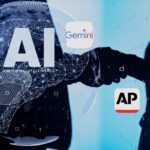Google Research has unveiled a groundbreaking AI co-scientist system, built on the Gemini 2.0 AI model, that is transforming scientific research across multiple disciplines. This sophisticated multi-agent system is designed to accelerate breakthroughs in fields ranging from quantum computing to genomics and neuroscience, marking a significant advancement in research methodology.
At the heart of this innovation is the AI co-scientist, a collaborative system that works alongside human researchers to analyse scientific literature, synthesise complex information, and generate novel hypotheses. This technology addresses the growing challenges in modern science, particularly the exponential increase in published research and the need for cross-disciplinary insights.
The system’s practical applications have already shown promising results in biomedical research. Notable achievements include drug repurposing for acute myeloid leukaemia, identifying targets for liver fibrosis treatment, and understanding antimicrobial resistance mechanisms. Many of these AI-driven discoveries have received experimental validation, demonstrating the system’s real-world effectiveness.
Google Research has expanded its AI capabilities beyond the co-scientist system. AMIE, a multimodal AI agent featured in Nature, enhances medical diagnostics through advanced visual data interpretation. Additionally, the REGLE system, an unsupervised deep learning model, has made significant progress in genomics research by identifying connections between genetic variants and disease susceptibility.
A notable achievement comes from the DeepVariant models, developed as part of the Personalised Pangenome References collaboration. These models have reduced genome analysis errors by 30%, particularly benefiting individuals from diverse ancestral backgrounds.
Google’s collaborative approach with academia and industry partners has been crucial in maximising the societal impact of these innovations. According to Juraj Gottweis, Google Fellow, and Vivek Natarajan, Research Lead, the AI co-scientist represents more than just computational advancement—it serves as a genuine research partner that expands the boundaries of scientific possibility.
The impact of these developments extends beyond immediate applications. By automating time-intensive processes like data synthesis and hypothesis generation, researchers can focus on more complex aspects of scientific investigation, accelerating the path from concept to real-world application.
Looking ahead, Google Research anticipates expanding AI’s role across various scientific domains. The technology’s evolution in reasoning, creativity, and domain knowledge is expected to influence fields such as climate science and neuroscience, potentially addressing some of humanity’s most pressing challenges.
News Source: https://blog.google/technology/research/google-research-scientific-discovery/









